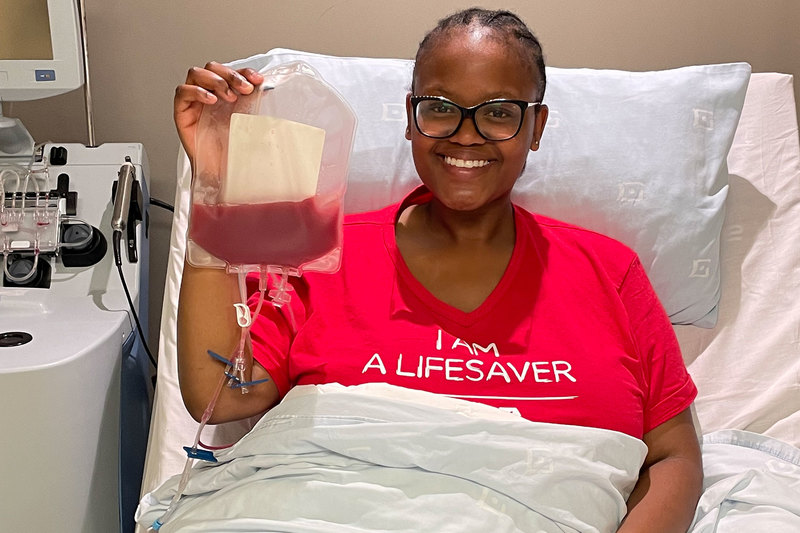Siphosethu Vumisa on giving a stranger hope ‘to live, to love’
27 June 2023 | Story Niémah Davids. Photo Supplied. Voice Cwenga Koyana Read time 5 min.
To some, she may be a hero, but Siphosethu Vumisa doesn’t see it that way. In fact, she said, when she received a call that her blood stem cells (bone marrow) matched those of a patient with blood cancer – in desperate need of a transplant – Vumisa had a thuma mina (send me) moment.
“I was shocked [when I received the call], a bit anxious as well. But, also amazed by the news. I was so happy to hear that my stem cells could help someone in need. By registering as a donor, I said: ‘send me’, and I wanted to start the process without hesitation,” she said.
Vumisa, who is studying towards her film and media degree at the University of Cape Town (UCT), said registering as a potential donor was a “no-brainer” when she first learned about blood cancer earlier this year. And knowing she fit DKMS Africa’s donor eligibility criteria was a sign that she was destined to help someone in need. DKMS Africa is a non-profit organisation dedicated to fighting blood cancers and improving the survival rate among patients with this group of diseases. The organisation’s goal is to recruit a continent-wide ethnically diverse registry of donors committed to helping anyone in need of a life-saving transplant.
Niémah Davids (ND): Why were you motivated to become a stem cell donor?
Siphosethu Vumisa (SV): There’s a simple answer to this question – I wanted to help give someone a second chance at life. It costs absolutely nothing and it’s very fulfilling.
“Awareness needs to be everywhere and reach everyone to save lives.”
ND: Do you know anyone in your immediate circle (family or friends) who is or has been affected by blood cancer?
SV: Personally, no. And to be honest, I didn’t even know that something like blood cancer existed until I attended a workshop not too long ago. So, more awareness is definitely necessary – in schools, at various faculty levels at university and not just in health sciences where students are taught about these diseases and staff are aware that they exist, and in the workplace. Awareness needs to be everywhere and reach everyone to save lives.
ND: What are some of the key need-to-knows for those who’d also like to register?
SV: Well, you need to be between the ages of 17 and 55, and you must be in good health. It’s as simple as that. Once you sign up, you will need to answer a brief medical questionnaire that will help the team to establish whether you can safely donate your blood stem cells. If you tick all the right boxes, a courier will deliver a swab kit to your home at no cost.
Once you receive your kit, you need to swab the inside of your mouth (cheeks), repackage the swab and the courier will collect it within a few days. The swab is then analysed to determine your human leukocyte antigens (HLA) characteristics. I was told that the donor’s HLA need to be as close to the patient’s as possible in order to be considered. After the DKMS team has analysed the sample, your information is loaded onto the registry and you will be available to patients searching for a donor.
ND: What happens when you are a match?
SV: When you come up as a likely match, the donation process can start. But you will need to provide a blood sample to confirm a 100% match first, as well as to check for HIV, hepatitis viruses and other infections. You will also need to undergo a full medical examination to establish other health risks and conditions.
ND: How are the stem cells extracted for harvesting?
SV: A needle was inserted into my thigh and the blood was drawn from there. The blood then went through a stem cell separating machine to collect the stem cells. The blood was then pumped back into the body on a repeated cycle.
ND: What have you been told about the recipient?
SV: Not much, really. I only know the gender and the age, and I can’t disclose that information.
“Who wouldn’t want to give someone a second chance – to live, to love, to be free of illness and to contribute meaningfully to this world?”
ND: Finally, why was it important for you to go through this process for someone you don’t know and will never know?
SV: Who wouldn’t want to give someone a second chance – to live, to love, to be free of illness and to contribute meaningfully to this world? It’s fulfilling on levels I can’t put into words and I’m so happy that I could give someone hope again. I answered my thuma mina moment. Now, others need to do it too.
 This work is licensed under a Creative Commons Attribution-NoDerivatives 4.0 International License.
This work is licensed under a Creative Commons Attribution-NoDerivatives 4.0 International License.
Please view the republishing articles page for more information.










